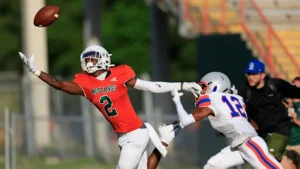
Regarding Cooper Flagg, Stephen A. Smith has one significant worry.
In the world of sports commentary, few personalities are as outspoken and influential as ESPN’s Stephen A. Smith. Known for his sharp opinions and unfiltered takes, Smith has built a reputation as a credible, albeit controversial, figure in basketball discourse. His views on emerging players, especially those with the potential to dominate the NBA, often stir discussions in the basketball community. One player who has recently captured Stephen A. Smith’s attention is Cooper Flagg, the 17-year-old basketball phenom from Maine, whose name has been swirling around NBA circles due to his remarkable talent and promise. However, despite Flagg’s potential, Smith has expressed a significant worry regarding the young player’s future.
This article will delve into Stephen A. Smith’s concerns about Cooper Flagg, analyzing the factors that shape his worry and what it means for Flagg’s future in basketball. Smith’s apprehension can be broken down into several key themes: the pressure of expectations, the influence of AAU basketball, and the risks of early fame in the social media era.
Before addressing Smith’s concerns, it’s crucial to understand who Cooper Flagg is and why his name is so heavily discussed. Flagg, a 6’8″ forward, has been widely regarded as one of the most promising young players in basketball for the past few years. His combination of size, skill, and basketball IQ has drawn comparisons to some of the game’s greats. He is known for his exceptional shot-blocking ability, versatility on defense, and high basketball IQ. Many scouts believe that Flagg could be the next big thing in the world of basketball, potentially a top pick in the NBA Draft in the future.
Flagg’s talent has led to significant interest from top colleges and NBA scouts. His impressive performances in high school competitions and AAU tournaments have made him a household name among basketball enthusiasts. However, it is this immense attention that Stephen A. Smith fears might be a double-edged sword for the young star.
One of Stephen A. Smith’s major worries about Cooper Flagg is the pressure of heightened expectations. In Smith’s eyes, Flagg’s immense talent could place an unrealistic burden on him to live up to the hype before he’s even had the chance to develop fully. Smith has seen countless young athletes rise to prominence only to crumble under the weight of expectation.
For example, players like Anthony Bennett, who was selected as the No. 1 pick in the 2013 NBA Draft, or even the more recent example of Zion Williamson, have faced extreme expectations that many of them struggled to meet. Smith often emphasizes that while talent is crucial, so is mental resilience, something that takes time to develop. With Flagg being compared to the likes of Kevin Durant and other NBA greats, Stephen A. fears that such lofty comparisons could derail his development if the weight of those expectations becomes too much to handle.
Flagg, still so young, might find himself constantly under the microscope. Whether it’s his performance in high school games, AAU tournaments, or any future showcases, every mistake or misstep could be magnified. This kind of scrutiny, Smith believes, could lead to unnecessary stress and a loss of confidence. Rather than allowing Flagg to grow into his game at his own pace, he could be rushed into fulfilling a prophecy that may not even be possible.
Another concern Stephen A. Smith has raised regarding Cooper Flagg is the impact of the AAU basketball system. AAU, or Amateur Athletic Union, has become an essential part of the basketball ecosystem, particularly for young players who aspire to play at the highest levels. While it provides opportunities for exposure and competition, Smith has often been critical of how the AAU system can warp a player’s development.
Smith’s worry is rooted in the notion that the AAU system, while beneficial in some respects, can promote a culture of individualism over team play. Many top AAU programs prioritize showcasing the individual talents of players rather than developing team-oriented skills. In this environment, it’s easy for players to become caught up in their personal highlight reels, focusing on their ability to stand out rather than contributing to team success.
Stephen A. Smith has often discussed how AAU basketball creates a world where every game feels like an audition for a future NBA career. Players like Cooper Flagg, who already possess elite skills, might find themselves in situations where they are pressured to perform at a higher level than their development would naturally dictate. This system could potentially cause Flagg to make poor decisions on the court, as he may feel the need to put up big numbers to maintain his standing in the eyes of scouts, sponsors, and fans.
Furthermore, Smith points out that AAU can sometimes lead to bad habits. Because these tournaments often focus on individual accolades, players may neglect fundamental aspects of the game, such as passing, defending, and playing within a system. This focus on “star-making” rather than team development is something that Stephen A. believes could hurt Flagg in the long run. Transitioning from the freewheeling environment of AAU to the more structured and disciplined world of college or the NBA can be a difficult adjustment for many young players.
In today’s world, social media plays an undeniable role in shaping the careers and public perceptions of young athletes. Cooper Flagg, being one of the most high-profile basketball prospects in recent years, has found himself under constant scrutiny from fans, analysts, and even casual observers. Stephen A. Smith has often warned about the dangers of early fame, particularly when young players are thrust into the spotlight before they have had time to mature emotionally and mentally.
With platforms like Twitter, Instagram, and TikTok, athletes like Flagg are exposed to millions of eyes daily. While this attention can lead to lucrative endorsement deals and increased visibility, it also opens the door for relentless criticism and unrealistic comparisons. One misstep, one poor game, or even a single moment of controversy can result in a social media firestorm that could derail a young player’s confidence and public image.
For Cooper Flagg, who is still navigating the challenges of adolescence, Smith fears that such fame could become overwhelming. The public’s expectations are not always tempered with understanding. Fans often forget that young athletes, no matter how talented, are still learning and developing, both on and off the court. Stephen A. Smith has pointed out that social media has created an environment where athletes are constantly on display, where even a minor mistake can become viral, damaging their reputation.
Finally, Stephen A. Smith emphasizes the importance of having a solid support system in place for players like Cooper Flagg. No matter how talented an athlete may be, the road to success is rarely a straight line. It requires a network of coaches, mentors, family members, and friends who can provide guidance and emotional support. For young players like Flagg, Smith stresses the importance of keeping grounded and surrounding themselves with people who have their best interests at heart.
Without the proper support, the challenges of fame, pressure, and the demands of high-level basketball can become too much to bear. Smith has often discussed how critical it is for young athletes to have mentors who can help them navigate the complexities of professional sports. In Flagg’s case, having a strong foundation could make all the difference in his development, ensuring that he doesn’t fall victim to the pressures that have derailed many promising careers in the past.
Stephen A. Smith’s significant worry about Cooper Flagg is rooted in his concern for the young player’s mental and emotional well-being as he faces the intense pressures of early fame, high expectations, and the challenging environment of AAU basketball. While Flagg’s talent is undeniable, Smith’s cautionary approach highlights the reality that basketball is not just about raw skill—it’s about the ability to navigate the complexities of professional sports.
Flagg has the potential to become one of the best in the game, but like many young athletes before him, he must be prepared for the challenges that come with it. The worry that Smith expresses is not about Flagg’s talent, but rather about the external pressures that could hinder his growth. If Cooper Flagg can overcome these challenges, he may just fulfill the immense promise that many see in him. However, only time will tell whether he can handle the weight of the expectations and carve out a successful career.





